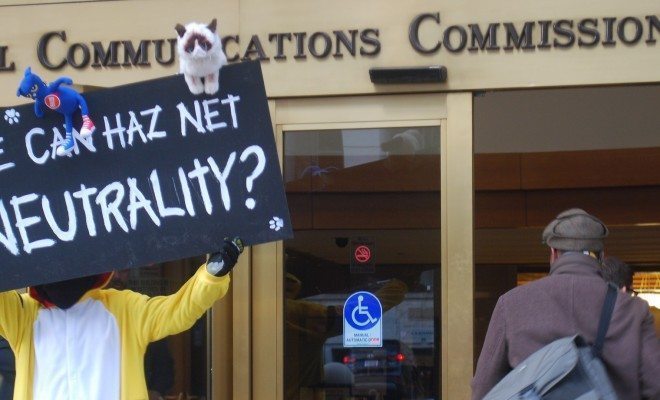 Image courtesy of [Free Press via Flickr]
Image courtesy of [Free Press via Flickr]
News
Net Neutrality Wins: What’s Next?
After a long period of back and forth, political debate, and frustration, the proponents of net neutrality have won–for now, at least. The Federal Communications Commission (FCC) solidified net neutrality this week.
For those of you who have been ignoring the net neutrality debate for the past year or so–and I don’t blame you, it sounds way more boring than it is–net neutrality is essentially the principle that Internet Service Providers (ISPs) shouldn’t be able to dictate the prioritization of pages on the internet. The FCC, in a 3-2 vote, just confirmed that status quo with its decision, which don’t allow ISPs to dictate who gets to be in a “fast lane”–essentially have their pages load faster than others for a fee paid to the ISP, or block pages. The FCC ruling also allows the government to step in if it’s believed that the principles of net neutrality are being broken. As PC World summed it up, the decision will:
Reclassify fixed broadband lines under Title II of the Telecommunications Act. This turns ISPs and mobile broadband providers into public utilities.
This is truly great news, especially for the vast majority of Americans who rely on the equal treatment of internet sites for work, education, and just plain old fun. That being said, not everyone is happy. This is bad news for ISPs, which now don’t get to capitalize on the ability to charge different sites for the pleasure of fast lanes, as well as the politicians who receive money from those ISPs.
Verizon, for example, responded to the news with sarcasm akin to a particularly angsty teenage girl. The company put out a press release in typewriter font, made to look like a memo straight from a typewriter, and dated it 1934. This was an apparent reference to the fact that Verizon thought the FCC’s ruling seemed a bit outdated. The release opened with this classic line:
Today (Feb. 26) the Federal Communications Commission approved an order urged by President Obama that imposes rules on broadband Internet services that were written in the era of the steam locomotive and the telegraph.
Verizon didn’t just pout via typewriter font though–it also released the memo in Morse Code.
While Verizon was wandering around with its panties (I’m sorry, it’s 1934, so knickers) in a twist, other ISPs were gearing up for a fight as well. David Cohen, Comcast’s Executive Vice President, stated, “After today, the only ‘certainty’… is that we all face inevitable litigation and years of regulatory uncertainty,” clearly hinting at some sort of an impending lawsuit from the tech giant. AT&T had hinted at a similar future a few weeks ago when its lawyer Hank Hultquist wrote letters saying that the FCC’s rulings, if they were to protect net neutrality, wouldn’t hold up in court. The letters appeared to cite heavily from Supreme Court decisions on similar topics.
The rules will become official this summer, so if you’re following this whole mess, anticipate some interesting court battles at that point.








Comments